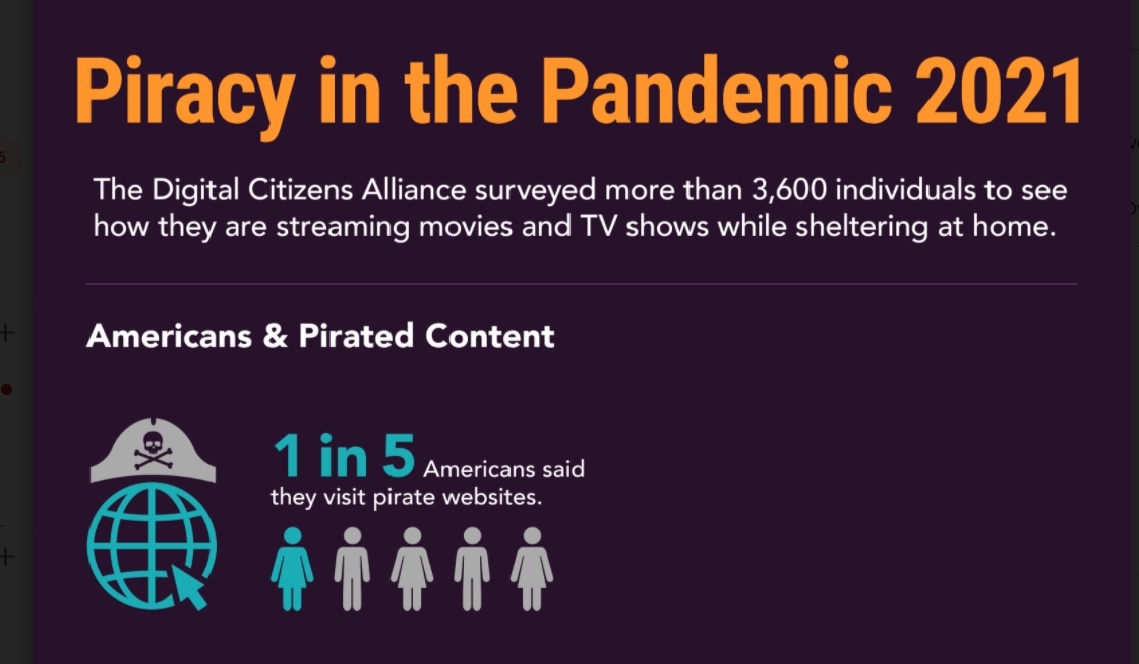DCA Says COVID-Fueled Pirate Streaming is Big Malware Threat
Said combination of content appetite and remote work is problematic

The smarter way to stay on top of the streaming and OTT industry. Sign up below.
You are now subscribed
Your newsletter sign-up was successful
The one-two punch of a pandemic and online piracy is a big problem, thanks in part to the increased appetite for video streaming during COVID-19.
That is the conclusion of a new research survey from the Digital Citizens Alliance (DCA).
With millions working from home, including on sensitive and confidential government work, DCA said there is a substantially raised threat level of malware and cybersecurity breaches if those workers have piracy devices or apps at home as well, what it calls "a toxic combination for cybersecurity."
The SurveyMonkey research study commissioned by DCA found that the one in 10 people who had such devices or apps were three times more likely to report a malware issue than those without them, which is a big problem if those at-home workers are in corporate finance, national security, government, medicine or the law. In addition, one in five said they had at least visited a pirate website.
Fully half of those who both identified themselves as working in jobs handling sensitive or confidential information and who had a piracy device in their home reported having "an issue" with malware in the past year, compared to only 17% for those who did not have a piracy device.
“When tens of millions of Americans were forced to work from home, it created a golden opportunity for hackers to mine their computers for sensitive information,” said Tom Galvin, executive director of the DCA, of the study findings. “Many Americans don’t realize that they open a window to their home when they plug a piracy device into their network. And if they work in jobs that can affect the economy or national security, for example, it’s a recipe for disaster.”
One of the key ingredients, CDA said, was Trojan Horse of streaming as the "go-to" method for watching TV shows and movies, an opportunity hackers seized to spread malware.
The smarter way to stay on top of the streaming and OTT industry. Sign up below.
For example, said DCA, not long after a researcher downloaded a piracy app, malware had forwarded their Wi-Fi network name and password to a server that was apparently in Indonesia. And what was once thought as a big threat to at-home consumers has been transformed into a threat to businesses small and large now that so much of that business is being transacted from home, where malware could transfer from home to work computers via a home network.
The key takeaways include:
- Not surprisingly, a majority (two-thirds) of respondents said they have been watching more TV shows and movies during the pandemic, with the 18-29 demo mostly likely (71%) to say that has been the case.
- About half (52%) said there was "more than enough" content to satisfy their increased appetite for video.
- About 20% said they visit pirate websites and about 10% said they have a pirate device or app, with a third to them saying they got them online, which DCA said its research has found are being "peddled" via Facebook, Craigslist and eBay, among other sites.
The online poll was conducted Feb. 3-4 among 3,634 U.S. residents 18-plus. The margin of error for the full sample is plus or minus 2 percentage points.
Contributing editor John Eggerton has been an editor and/or writer on media regulation, legislation and policy for over four decades, including covering the FCC, FTC, Congress, the major media trade associations, and the federal courts. In addition to Multichannel News and Broadcasting + Cable, his work has appeared in Radio World, TV Technology, TV Fax, This Week in Consumer Electronics, Variety and the Encyclopedia Britannica.

